- Home
- Raymond E. Feist
Exile's Return: Conclave of Shadows: Book Three Page 8
Exile's Return: Conclave of Shadows: Book Three Read online
Page 8
Kaspar tried to not sound scornful, but he said, “Let me guess. Magic rings?”
Flynn glanced at the other two who nodded, then he reached into his belt-pouch and brought out one. It glowed in the gloom of the warehouse.
Kaspar stood up, walked over to Flynn and took the ring. He examined it: it was made from a dull metal, not unlike pewter, save it glowed. “Anyone try to wear it?” asked Kaspar.
Flynn said, “A man named Greer did. He put it on and it seemed to do nothing, for a while. Then, suddenly, one night he attacked and murdered Castitas. McGoin had to kill Greer to keep him from slaughtering more of us. Then, I put it on to try and work out what had happened to Greer, but after a while I started seeing things. No one’s worn it since then.”
“Why didn’t you throw it away?”
“You ever heard of Stardock?”
Kaspar had, but he shook his head. He decided it would be better to feign ignorance—if he was going to pass himself off as a common man, he couldn’t appear too worldly. “Can’t say I have.”
“It’s an island in the Great Star Lake, on the border of Kesh and the Kingdom. A community of magicians live there, very powerful—”
“And rich,” interjected McGoin.
“—and rich,” agreed Flynn. “We’ll sell the ring to them.”
Kaspar looked around the room. “Something tells me there’s more to this than the ring. Look, if I have this right, you were thirty prosperous merchants who brought along enough gold that if you three had just decided to do away with the other twenty-six, you’d be set for life, right?”
“It was a small fortune,” said Kenner.
“So I assume you’re not murderers, but astute traders and now have goods that are worth more?”
They nodded.
“So, there’s a reason you’re not just hiring a bunch of mercenaries for protection as you head south and find a ship for home?”
The three men glanced at one another. At last Flynn said, “We were coming to that. The ring is just a trinket. I mean it must do something special, as two men are dead because of it, but the ring’s not worth all this bother. There is something else.”
Flynn motioned to the far side of the warehouse and the four men moved to where he indicated. A wagon was standing there, a simple freight-hauler almost indistinguishable from those Kaspar had seen wending their way though the streets of his own city. In the bed rested something covered by an oiled canvas, and from the size of it, Kaspar already had an idea of what it could be. Flynn jumped into the wagon and pulled back the edge of the canvas.
It was a body, at least Kaspar thought it was one, or perhaps it was just an empty suit of armor. But whatever it was, it was unlike anything he had ever seen before.
Kaspar climbed up next to Flynn and removed more of the canvas. If it was armor it looked seamless. It was black, with a dull golden trim along ridges at the neck, shoulder, wrist, thigh, and ankles. Kaspar knelt and touched it. It was made of metal, but a smoother one than any he had seen before. Whoever owned it would be tall, taller than Kaspar’s two inches over six feet.
Back in Opardum, Kaspar had purchased the finest armor known in the Eastern Kingdom, from the Master Armorers from Roldem, but this was far beyond their ability to fashion.
“Hit it with your sword,” said Flynn, leaping out of the wagon to give Kaspar room. Kasper stood, drew his sword, and swung lightly against the shoulder plate, and the blade rebounded, as if he had struck hard rubber. Kasper again knelt next to the figure.
“Is there someone inside it?” he asked.
“No one knows,” answered Kenner. “We can’t find any way to remove the helm or any other part of it.”
“It has an ill aspect,” observed Kaspar, speaking slowly.
The helm was simple, as if a cylinder had been cut at an angle and then had the sharp edges rounded off, leaving a continuously smooth line from shoulder to crown, without any edge or point. Then it was pinched slightly in front, so that from above it looked slightly teardrop in shape rather than truly round. Both sides of the helm were flanked by what could have been wings, but unlike the wings of any creature Kaspar had hunted; they were shaped like a raven’s, yet curved back slightly, following the sides of the helm, and they were webbed like those of a giant bat—but this was no normal bat. A single eye slit allowed for vision. Kaspar attempted to peer inside.
“Can’t see a thing,” observed McGoin. “Jerrold even tried to hold a torch up close and almost set his hair on fire trying to look in.”
“There’s something there: a glass or quartz, or something hard enough to stop a dagger’s point,” said Kenner.
Kaspar sat back. “It’s unique, I’ll admit. But why haul it all the way across the ocean to Stardock? There must be someone around here who’ll give you a fair price for it.”
“It’s magic, no doubt,” said Flynn. “And around here magicians are scarce and poor.” He looked at his two friends, and added, “We did try to find buyers at first, but quickly realized this land is too destitute. We could have taken what we could find and then returned home, and along with the gold we still had and what we’d purchased, we could have lived very comfortable lives.”
“But we’re not thieves,” said Kenner. “We had partners and some of them had families. We could have given a small share of the profits to each of them, but would that have compensated for losing a husband or father?”
Kaspar slowly said, “They knew there’d be a risk traveling here.”
“Yes, but I have a wife and three sons,” said McGoin, “and I’d like to think that if I was buried up north, one of my companions would return home and give my widow enough to care for our sons and their futures.”
“Noble sentiments,” said Kaspar jumping down from the wagon. “What else?”
Flynn handed Kaspar a sword. It was as black as the armor, and when he put his hand on the hilt, a slight vibration seemed to shoot up his arm. “Feel it?” asked Flynn.
“Yes,” said Kaspar and he handed the blade back. It was lighter than he had expected, but the vibrating made him feel uneasy.
Flynn walked over to the armor and said, “Now watch.” He took the ring out of his pouch again and held it close to the metal. It immediately switched from a dull glow to a brilliant shine. “There’s no doubt about the armor’s magic, I think this proves it.”
“Persuasive,” agreed Kaspar. “Now, what does all this have to do with me?”
“We need an extra man,” said Flynn. “The fact you’re from the north and also wish to return to the Kingdom is a bonus. We were just looking to hire a clever swordsman to travel with us to the City of the Serpent River—we’re hoping that the clan war is now over.” Flynn put his hand on Kaspar’s shoulder. “But, as I said, perhaps the gods have placed you in our path for a reason, for a man who will go the entire distance through his own desire is better than any hired sword could be. We’re prepared to make you an equal partner.”
Kenner seemed on the verge of objecting, but then said nothing while McGoin nodded.
“That’s generous,” said Kaspar.
“No,” replied Flynn. “Before you agree you must know everything. Not all our lads died before we found this thing.” He pointed to the wagon. “The peasant who showed us where the armor lay would have nothing to do with retrieving it, wouldn’t go near it once he had uncovered it. We had discovered enough riches to live like kings, so after we loaded up four wagons worth, we headed south.
“By the time we reached your town of Heslagnam, there were only six of us left, and we were down to one wagon. We’d abandoned a nation’s wealth on the road behind us.”
Kaspar didn’t like what he was hearing. “So, someone wasn’t happy about you taking the body, armor, or whatever it was.”
“Apparently so. We were never attacked during the day, or while resting in a town or village, but at night, alone on the road, things started to happen.”
“One night Fowler McLintoc just died. Not a mar
k on him,” said Kenner.
“And Roy McNarry went off to relieve himself one evening and never came back. We looked for a day and found not a hint of him,” added McGoin.
Kaspar laughed, a short bark that sounded halfway between dry amusement and sympathy. “Why didn’t you just leave the bloody thing and take the rest?”
“By the time we’d figured out that it was the body they wanted, it was too late. We had already abandoned the other three wagons. We measured out the best of the gems—they’re in a bag over there—and concealed most of the jewelry and other valuable artifacts; we found a cave, marked it, and just left it all there. We sold the horses for food along the way, and eventually got here. But every week or so, someone always died.”
“This tale is not persuading me to go with you.”
“I know, but think of the prize!” said Flynn. “The magicians will pay a king’s ransom for this thing, and you know why?”
“I’m eager to learn,” said Kaspar dryly.
Flynn said, “I believe you are a man of some education, for you speak the King’s Tongue like a noble, yet you’re from Olasko.”
“I’ve had some schooling,” Kaspar admitted.
“Do you know the tale of the Riftwar?”
“I know that one hundred years past an army invaded from another world through a magic rift and almost conquered the Kingdom of the Isles.”
“More,” said Flynn. “There’s a lot that was never written in the histories. I heard something from my Grand-da—who served as a luggage boy at the battle of Sethanon—and it concerned dragons and ancient magic.”
“Spare me your grandfather’s fireside tales, Flynn, and get to the point.”
“Have you ever heard of the Dragon Lords?”
Kaspar said, “I can’t honestly say I have.”
“They were an ancient warrior-race, who lived upon this world before men; they were even here before the elves. They were a race of dragon riders who could perform powerful magic. They were crushed by the gods during the Chaos Wars.”
“That’s theology, not history,” said Kaspar.
“Maybe, maybe not,” answered Flynn, “but the temples teach it as doctrine, and while no mention is made of the Dragon Lords in the texts, the legends still remain. But look at that thing, Kaspar! If that’s not a Dragon Lord, straight out of its ancient tomb, I don’t know what it could be, but I’ll wager the magicians at Stardock will want to know, and will pay to find out.”
Kaspar said, “So you need a fourth man to carry this thing north, help ferry it from Port Vykor to this Stardock, and then ask a reward from the magicians?”
“Yes,” said Flynn.
“You’re mad,” said Kaspar. “You should have stowed it in the cave and brought the treasure out with you instead.”
Kenner, McGoin, and Flynn looked at one another. Finally Kenner said quietly, “We tried. We just can’t.”
“What do you mean you can’t?”
“We tried to do what you said; but after we sealed the cave, we were no more than half a mile down the road before we had to turn around and go back. Then we stored all the gold and other goods, and fetched this thing out.”
“You are madmen,” said Kaspar. “I could go with you for a horse and the price of passage to the Kingdom, but I couldn’t promise to stay with you after that. You’ve given me too many good reasons to say no.” He paused for a moment. “In fact, I think I’ll say no right now and avoid the trouble.”
Flynn shrugged. “Very well. Try to leave.”
Kaspar jumped down from the wagon, his sword still in his hand. “What do you mean?”
“We won’t stop you,” said Flynn. “That’s not what I meant.”
Kaspar started to circle the three men. When he reached the door of the warehouse he said, “I bid you good fortune gentlemen, and hope we may hoist a drink together in a Kingdom tavern some day, but I doubt we will; this commission has all the hallmarks of a doomed undertaking and I’ll have none of it, thank you.”
He turned, pushed the door open, and tried to step through.
He couldn’t.
SEVEN
DECISION
Suddenly, Kaspar hesitated.
He wanted to step through the door, but something made him wait. He turned and said, “All right, I’ll think about it.”
Flynn nodded. “You can find us here, but we have to be on the road by the day after tomorrow.”
“Why?” asked Kaspar.
“I don’t know,” said Flynn. “We just can’t stay in one place too long.”
Kenner added, “You’ll understand.”
Kaspar shrugged off the compulsion to stay and left the warehouse.
He wended his way through the early morning throng and found a cheap inn where the ale wasn’t too dreadful. He rarely drank before his midday meal, but today he made an exception. He spent more of his meager purse than he should have, but deep inside he already knew he would join Flynn and the others. Not because of some nonsensical magical coercion, but because he wanted to; these men could get him closer to home in the next six months than he could manage on his own over the next two years: he was no sailor, and would have to work for months to save the cost of his passage, and ships plying the waters between Novindus and Triagia were scarce in any case. Even taking a vessel to the Sunset Islands would cost him the local equivalent of two hundred gold coins—that was half a year’s work for a skilled craftsman in Olasko.
No, this way he would at least gain a horse and his passage to the Kingdom. From there he could walk home if he must.
He finished his ale and returned to the warehouse, finding the three men waiting. “You’re with us?” asked Flynn.
“To Port Vykor,” said Kaspar. “After that, we’ll have to see. I want a horse, enough gold for decent lodgings and food along the way, and my passage from Salador to Opardum. You can keep the rest of your wealth. Agreed?”
“Agreed,” said Flynn. “Now, we should prepare to leave at first light tomorrow. There’s a caravan heading south loaded with supplies for the military and while we can’t join it officially, we can shadow it for a while; it would keep bandits away from us.”
“Very well,” said Kaspar. “But first we have to find a coffin.”
“Why?” asked Kenner.
“Because down here people bury their dead, they don’t burn them, so a coffin under the tarpaulin will attract a lot less curiosity than that…thing will.” He pointed to the wagon. “You could drive it all the way to the City of the Serpent River without one, but I doubt you’ll get it past customs at Port Vykor. A late companion being brought home to rest, though—where do they bury the dead in the Kingdom?”
“Up around Quester’s View, I think.”
“That will have to do,” said Kaspar. He regarded his three new companions. “And if we do manage to get to the City of the Serpent River we will have to spend some of your booty on clothes. You gentlemen need to look more like cultured men of commerce than brigands and ruffians.”
McGoin ran his hand over his five days’ growth of beard and said, “You’ve the right of it, Kaspar.”
“Do you sleep here?”
Flynn and the others nodded. Flynn said, “We tried sleeping at inns along the way, but it’s impossible. You find yourself waking up, anxious to make sure that thing is safe.”
“Sometimes, two or three times a night,” nodded Kenner.
“So, now we sleep under the wagon,” said McGoin.
“Well, you three can sleep here if you must, but I’m for a hot bath, clean clothing, and a night in a good inn. Give me some coin, Flynn.”
Flynn dug out some silver pieces and handed them to Kaspar. “I’ll see you at first light.”
Kaspar left the inn and indulged himself for the first time since losing the citadel. He found a tailor and purchased a new tunic, trousers, and small clothes, as well as an outer jacket and a new felted beret with a metal pin clasping a false ruby. Then he found the best bathhouse in
the town—which wasn’t close to the standard of the great bathhouses in Opardum.
Afterward, Kaspar felt refreshed and reinvigorated. He took a room at an inn off the main town square, and discovered an agreeable barmaid who, after only a little coaxing, arrived at his door after the other guests had retired and her chores were finished.
An hour after drifting off into a deep, satisfied slumber, Kaspar came awake with a start. He glanced around the room and felt disoriented. Slowly, he realized where he was and rolled over to inspect his bedmate.
She was a pretty thing, no more than nineteen years old and typical of her calling; a poor girl hoping to catch a rich husband, or at least, garner a generous gift for her favors. Only time would tell if she ended up married, or in a brothel.
Kaspar put his head down again but sleep refused to return. He turned over and tried to clear his mind of images, but each time he started to drift off he would catch a disturbing glimpse of the wagon in his mind’s eye, and of what rested upon it.
Finally, he rose and dressed, leaving the girl a small gift of silver. If Flynn proved correct, there would be ample wealth to replace it soon enough.
He was opening the door quietly as the girl awoke. “Leaving?” she asked sleepily.
“I have an early day,” Kaspar said, closing the door behind him.
He made his way carefully through the dark streets, mindful that few lawful folk were about this late. Finally he reached the warehouse and opened the door to find Kenner awake and the others sleeping.
Kenner approached him, treading softly, and said, “Knew you’d be back before dawn.”
Kaspar ignored the urge to respond with a jibe, and simply replied, “Why are you awake?”
“One of us is always awake. It’ll be better now that you’re here. What’s the time?”
“About two hours after midnight,” said Kaspar.
“Then you can take the next three hours and wake McGoin after that.” Kenner climbed underneath the wagon, pulled a blanket over him, and settled in to sleep.

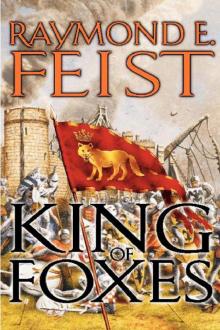 King of Foxes
King of Foxes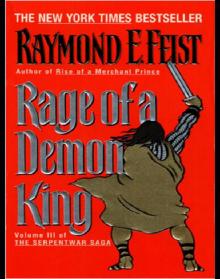 Rage of a Demon King
Rage of a Demon King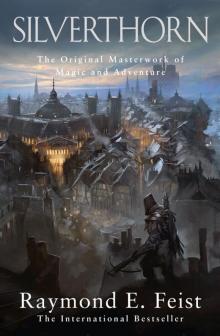 Silverthorn
Silverthorn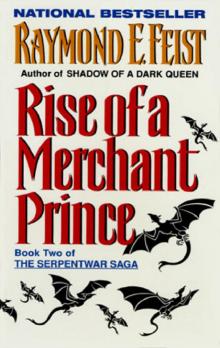 Rise of a Merchant Prince
Rise of a Merchant Prince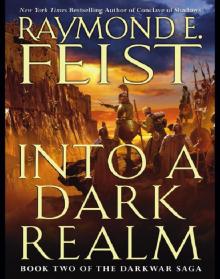 Into a Dark Realm: Book Two of the Darkwar Saga
Into a Dark Realm: Book Two of the Darkwar Saga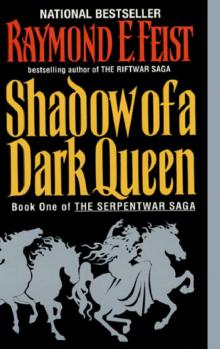 Shadow of a Dark Queen
Shadow of a Dark Queen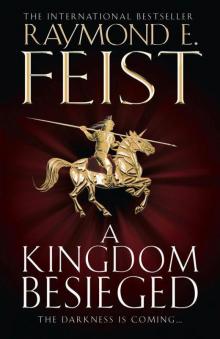 A Kingdom Besieged
A Kingdom Besieged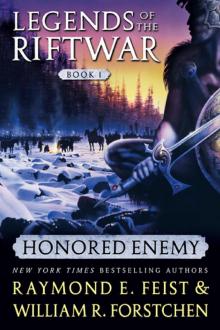 Honored Enemy
Honored Enemy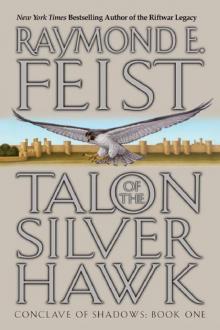 Talon of the Silver Hawk
Talon of the Silver Hawk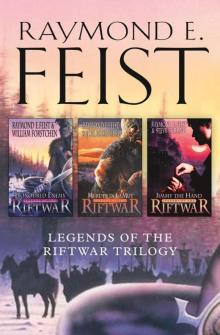 The Complete Legends of the Riftwar Trilogy
The Complete Legends of the Riftwar Trilogy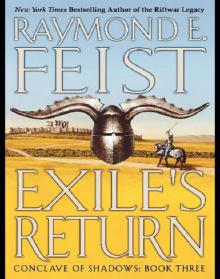 Exile's Return: Conclave of Shadows: Book Three
Exile's Return: Conclave of Shadows: Book Three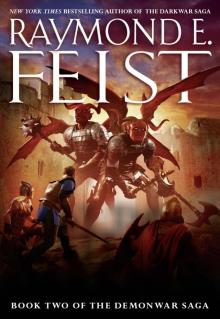 At the Gates of Darkness
At the Gates of Darkness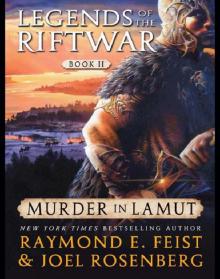 Murder in LaMut: Legends of the Riftwar: Book II
Murder in LaMut: Legends of the Riftwar: Book II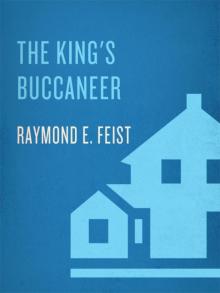 The King's Buccaneer
The King's Buccaneer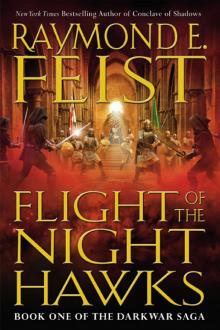 Flight of the Nighthawks
Flight of the Nighthawks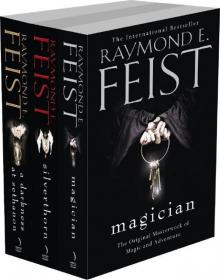 The Riftwar Saga
The Riftwar Saga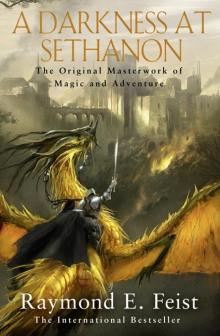 A Darkness at Sethanon
A Darkness at Sethanon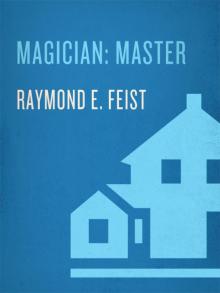 Magician: Master
Magician: Master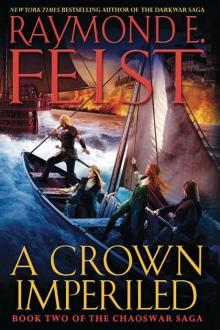 A Crown Imperiled
A Crown Imperiled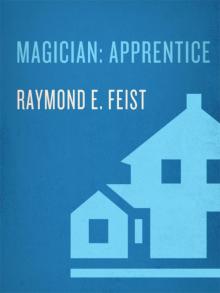 Magician: Apprentice
Magician: Apprentice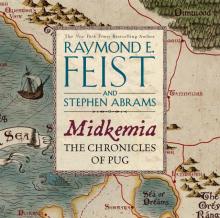 Midkemia
Midkemia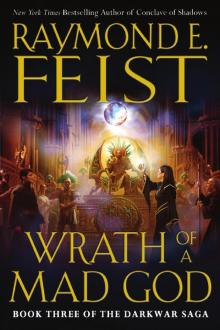 Wrath of a Mad God
Wrath of a Mad God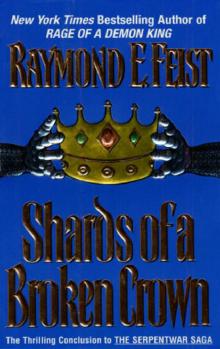 Shards of a Broken Crown
Shards of a Broken Crown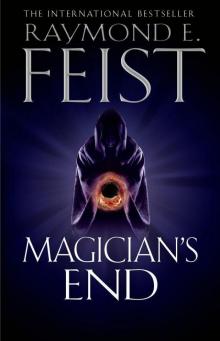 Magician's End
Magician's End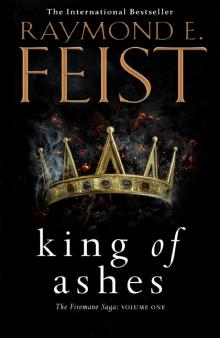 King of Ashes
King of Ashes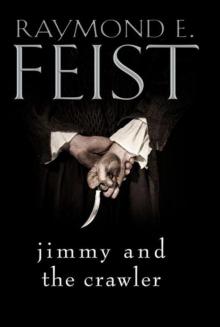 Jimmy and the Crawler
Jimmy and the Crawler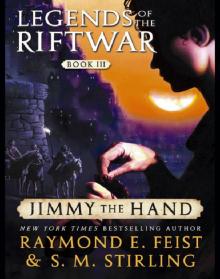 Jimmy the Hand: Legends of the Riftwar, Book 3
Jimmy the Hand: Legends of the Riftwar, Book 3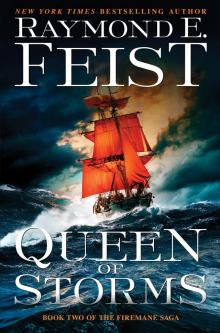 Queen of Storms
Queen of Storms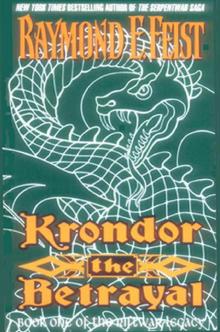 Krondor: The Betrayal
Krondor: The Betrayal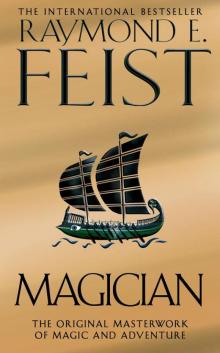 Magician
Magician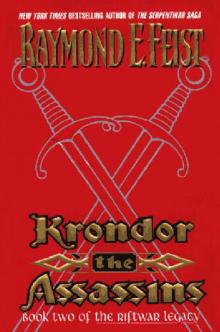 Krondor: The Assassins
Krondor: The Assassins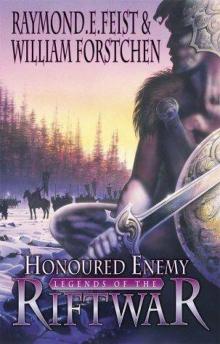 Honoured Enemy
Honoured Enemy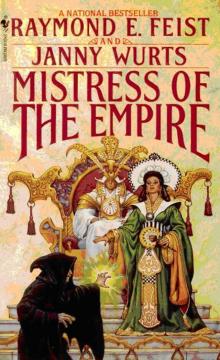 Mistress of the Empire
Mistress of the Empire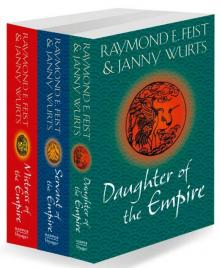 The Complete Empire Trilogy
The Complete Empire Trilogy Legends 1 - Honoured Enemy
Legends 1 - Honoured Enemy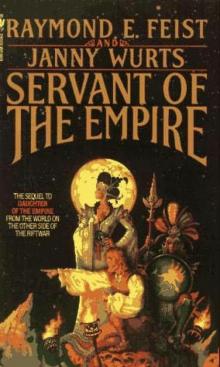 Empire - 02 - Servant Of The Empire
Empire - 02 - Servant Of The Empire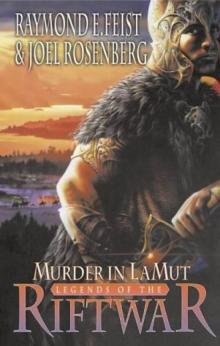 Murder In LaMut
Murder In LaMut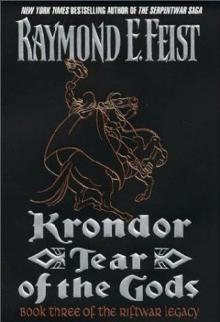 Krondor Tear of the Gods
Krondor Tear of the Gods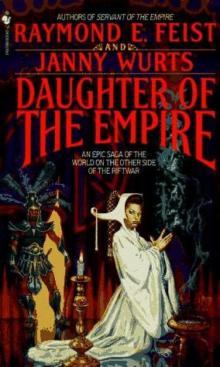 Empire - 01 - Daughter Of The Empire
Empire - 01 - Daughter Of The Empire![King of Ashes [Book One] Read online](http://i1.bookreadfree.com/i1/03/30/king_of_ashes_book_one_preview.jpg) King of Ashes [Book One]
King of Ashes [Book One]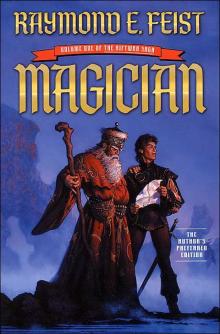 Magician (10th Aniversary Edition)
Magician (10th Aniversary Edition)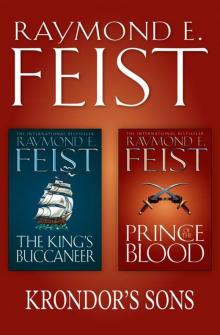 Prince of the Blood, the King's Buccaneer
Prince of the Blood, the King's Buccaneer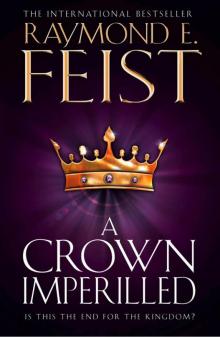 A Crown Imperilled cs-2
A Crown Imperilled cs-2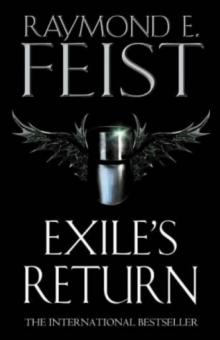 Exile's Return
Exile's Return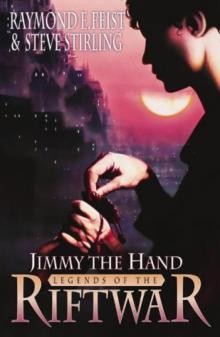 Jimmy the Hand
Jimmy the Hand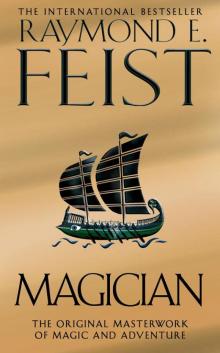 Book 1 - Magician
Book 1 - Magician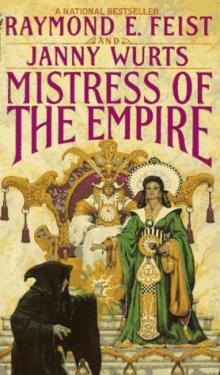 Empire - 03 - Mistress Of The Empire
Empire - 03 - Mistress Of The Empire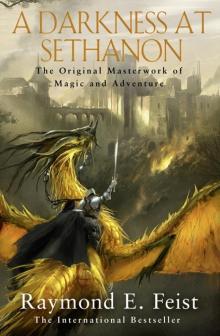 Darkness at Sethanon
Darkness at Sethanon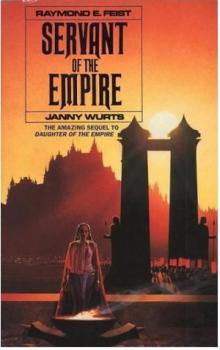 Servant of the Empire
Servant of the Empire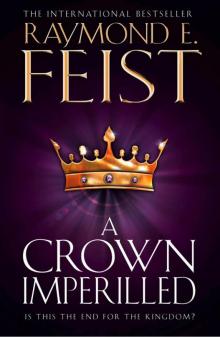 A Crown Imperilled
A Crown Imperilled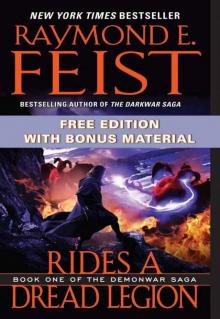 Rides a Dread Legion
Rides a Dread Legion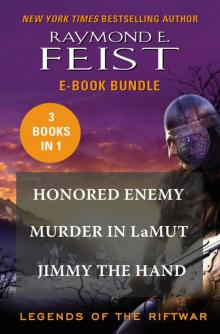 Legends of the Riftwar
Legends of the Riftwar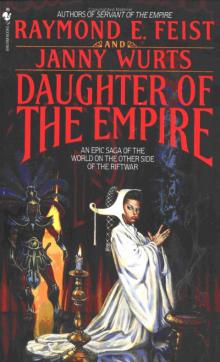 Daughter of the Empire
Daughter of the Empire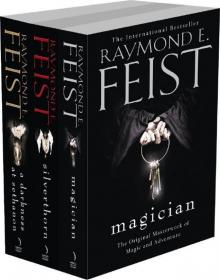 The Riftwar Saga Trilogy: Magician, Silverthorn and A Darkness at Sethanon
The Riftwar Saga Trilogy: Magician, Silverthorn and A Darkness at Sethanon